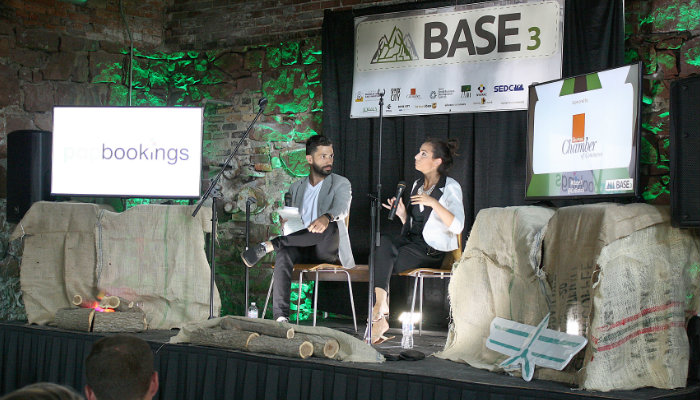
The working class city on the Missouri River has a history with tech innovation—a history it hopes to transcend.
At Base 3, Sioux City’s annual entrepreneurship event, a microbrewer passes out samples of hibiscus beer while live local musicians play in the background. Sioux City’s young, creative and ambitious mingle around the century-old, exposed red brick building in the heart of downtown, now owned by Iowa State University.
The founders of PopBookings in Kansas City, Scott Hanson and Erika Klotz, open the evening with a recap of their experience going into and out of the Spark Lab KC accelerator program. Brian Rand, creator of The Bakery in Sioux Falls, shares his heartfelt story about building an entrepreneurial community.
The night closes with a barn-burning crowd-pleaser from Mike Draper of Raygun. He shares his journey from small town Iowa to the Ivy League to selling t-shirts in Times Square and why he ultimately came back to Des Moines.
It’s an evening with a flavor you can find all across the region these days, an event inspired by regional startup events like Big Kansas City and Thinc Iowa. But Sioux City has its own backstory that gives it a unique place among startup communities.
The “golden years” of Gateway
In the mid-1980s Ted Waitt started Gateway 2000 (today Gateway, Inc.) in a barn outside of Sioux City, building and selling inexpensive PCs direct to consumers. The company hit the rise of the consumer PC market at just the right time and experienced stunning growth over the course of a decade, making them a Fortune 500 company.
Gateway is perhaps most well-known for embracing its Iowa identity in its branding, with its distinctive cow boxes and folksy advertising. It may have even been the first to coin the phrase “silicon prairie.” Anyone who lived through the 90’s probably remembers these ads:
Many Sioux City residents talk about those days like Husker fans talk about the Tom Osborne era. There were community cookouts and big cow-colored buildings popping up. Everything seemed to be booming.
Gateway Inc., now owned by Acer, still exists today. But for the residents of Sioux City, the story ended when Gateway moved to California in 1998. Although Gateway embraced its local community in its branding, its early investment came from outside the region. Moreover, the public reason for Gateway’s departure was to move to where the talent was. Investment and talent were elsewhere, and Gateway was looking to grow.
Today there are still big cow-colored buildings in Sioux City, partially filled with new tenants but mostly empty. Occasionally, you might see someone walking around town with an old Gateway jacket on. But there’s little left but traces of Gateway’s legacy.
Avalon Capital Group, which invests Waitt’s fortune, is based in California. The Ted Waitt Foundation was started in 1993 to help at-risk communities in Siouxland. Today it’s based in San Diego, helping to protect ocean life.
Betting on SOSINC
As if on cue, another Sioux City resident was catching the next big tech wave around the time that Gateway was cresting.
Robert Townsend, founder of SOSINC Communications, was one of the first to develop Voice over Internet Protocol (VoIP) technology. He had started his company in 1988 after working in the telecommunications industry, but in 1996 he started developing one of the first VoIP systems.
SOSINC was hot in the late 90’s, and many other cities were vying for them. Sioux City was deeply invested this time around. The city itself sold a 10-acre million-dollar section of a business park to the company for $1. Siouxland Ventures, a local venture capital group, invested $100,000 into the company as well, according to the Sioux City Journal.
In June of 2000 SOSINC moved into its new 50,000 sq. ft. headquarters with an announcement of an additional 30,000 sq. ft. expansion. By the end of 2000, according to Townsend, $10 million in expected investment did not arrive, due to the Dot-com stock market crash.
The fall of SOSINC, extensively documented in a 2001 Sioux City Journal article, was a terrible blow to Sioux City. The property was handed over to creditors, and employees sued for paychecks that never came. Townsend and his family members resigned.
“There’s been enough damage to my name in the Siouxland area that it wouldn’t be possible (to go back in business here),” Townsend said, in the Journal article. He moved to New Jersey to work as a consultant.
The new generation
This time around the city isn’t looking to bet on one horse; they want to build a sustainable entrepreneurial ecosystem. In just a few years the Startup Sioux City board has formed, Base 3 has boomed, and the Springboard Coworking space has opened.
Ryan Martinez and Sean Richardson at Flyover Technology represent the new generation of tech entrepreneurs in the city. They want to bring in fresh ideas from the outside, but they also champion their community in a genuine way.
Martinez and Richardson seem pleasantly surprised, like many people at Base 3 this year, at how quickly creators, innovators, and supporters are coming out of the woodwork in a city with a reputation for “not much happening.” When you talk with the founders of startups like SharedBinder, HelpAlert and SeedSlide, it’s clear that a very different future lies ahead for the city.
Beyond the moonshot
Perhaps a metaphor for Sioux City’s startup development is the US space program. The city had its Apollo moment with Gateway decades ago, which brought a lot of excitement and hype but left less of a legacy than many probably hoped.
SOSINC was Sioux City’s Challenger or Columbia moment, which has maybe cooled local interest in high-growth, high-risk startups.
But that story is now 15 years old. There’s a new generation coming up that is less interested in focusing on one company but instead wants to create broad-based community support for all kinds of entrepreneurs. Like “New Space” and space exploration, the startup community leaders in Sioux City want to make it easier, cheaper and faster for anyone to start and grow their business.
Although its past may seem like a cautionary tale, it’s also an asset for the city. Sioux City gets the idea of tech innovation. They know what it can mean for a city, in a way many communities in the region still don’t understand. They know the highs and lows. They also have a clear-headed acknowledgement of their strengths and weaknesses.
For a startup community just finding its footing, Sioux City is older and wiser than most.
—
Ryan Pendell is the managing editor of Silicon Prairie News.
Silicon Prairie News is a media sponsor of Base 3.




